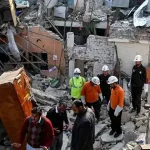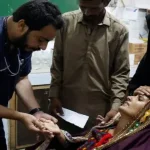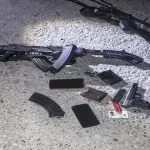BAGHDAD: Iraq’s Prime Minister Nuri Al-Maliki has asked parliament to declare a state of emergency after Sunni militants seized control of most of the country’s second largest city, Mosul.

Militants from the Islamic State in Iraq and the Levant (ISIL) and their allies overran a military base and freed hundreds of prisoners early on Tuesday in a spectacular strike against the Shiite-led Iraqi government.
The capture of Mosul by the ISIL — an offshoot of Al-Qaeda — and its allies followed four days of fierce fighting in Mosul and other cities and towns in northern Iraq.
The fall of Mosul deals a serious blow to Baghdad’s efforts to fight Sunni militants who have regained ground and momentum in Iraq over the past year and pushed into Mosul last week.
Across the border in Syria, embroiled in three years of civil war between President Bashar Assad and rebels seeking to oust him, ISIL fighters have seized control of swathes of eastern territory close to the Iraqi border.
ISIL militants from Iraq have joined the battle in Syria along with other foreign fighters. The jihadi group is seeking to establish an Islamist state by connecting territory it controls in western Iraq and eastern Syria.
Police, military and security officials told Reuters the insurgents, armed with anti-aircraft weapons and rocket-propelled grenades, had taken over almost all police and army checkpoints in and around the Mosul.
“We have lost Mosul this morning. Army and police forces left their positions and ISIL terrorists are in full control,” said an army colonel at the local military command. “It’s a total collapse for the security forces.”
Two Iraqi army officers said security forces had received orders to leave the city after militants captured the Ghizlani army base in southern Mosul and set more than 200 prisoners free from a high security jail.
The retreating army and police forces set fire to fuel and ammunition depots in order to prevent the militants from using them, the Iraqi officers said.
Two police sources and a local government official said the ISIL militants had also stormed a jail, allowing more than 1,000 prisoners to escape, which they identified as belonging mostly to ISIL and Al-Qaeda.
Thousands of families were fleeing the city toward the autonomous Kurdish region, which shares a border with Nineveh province, of which Mosul is the capital.
“Mosul now is like hell. It’s up in flames,” said Amina Ibrahim, who was leaving the city with her young children. “I lost my husband in a bomb blast last year, I don’t want my kids to follow him.”
On Monday, governor Atheel Nujaifi made a televised plea to the people of Mosul to fight militants. Nujaifi himself narrowly escaped the provincial headquarters in Mosul after militants surrounded it late on Monday.
Several army officers said Iraqi forces were demoralized and do not have the fighting stamina of ISIL fighters.
“We can’t beat them. We can’t. They are well trained in street fighting and we’re not. We need a whole army to drive them out of Mosul,” one officer said. “They’re like ghosts: they appear to strike and disappear in seconds.”








